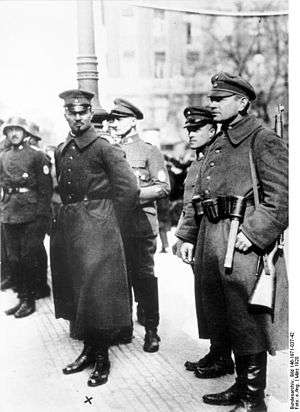Hermann Ehrhardt
| Hermann Ehrhard | |
|---|---|
 Hermann Ehrhardt (x) during the Kapp-Putsch in Berlin 1920 | |
| Born |
27 November 1881 Diersburg, Grand Duchy of Baden, German Empire |
| Died |
27 September 1971 (aged 89) Brunn am Walde, Lower Austria, Republic of Austria |
| Allegiance |
|
| Service/branch |
|
| Years of service | - 1918 |
| Rank | Korvettenkapitän |
| Commands held |
IX. Torpedo Boat Flotilla Marinebrigade Ehrhardt |
| Battles/wars |
Kapp Putsch |
Hermann Ehrhardt (29 November 1881 – 27 September 1971) was a German Freikorps commander during the period of turmoil in Weimar Republic Germany from 1918 to 1920, he commanded the famous II.Marine Brigade, better known as the Ehrhardt Brigade or Marinebrigade Ehrhardt.
Born in Diersburg, now part of Hohberg, Baden-Württemberg, he served in the German Imperial Navy as a Korvettenkapitän. At the Battle of Jutland in May 1916 he commanded the 17th half-flotilla of the IX. Torpedo-boat Flotilla; his flagship, SMS V27 was sunk in action. Later in the war he was involved in action in the southern North Sea and Dover Straits. By the war's end he was commander of the IX. Torpedo-boat Flotilla, which he led into internment at Scapa Flow in November 1918, returning to Germany with the majority of his crew shortly thereafter.
Following the defeat of the German Empire, Ehrhardt formed the II.Marine Brigade. A strong opponent of the Treaty of Versailles, he held strong monarchist views. The II.Marine Brigade was a force of around 6,000 men. They fought in north-west Germany, central Germany, Upper Silesia,[1] and Bavaria and participated in the unsuccessful Kapp-Lüttwitz Putsch of 1920. After the failed Putsch, Ehrhardt fled Germany, returning at a later time. In Bavaria, which was ruled by Gustav von Kahr at that time,[2] he formed the Organisation Consul,[3] and later the Viking League (Bund Wiking), a secret military society.[4]
Three years later during the Beer Hall Putsch, Ehrhardt and his deputy commander Eberhard Kautter refused to help Adolf Hitler's Nazi Party. Ehrhardt later contested for leadership with Hitler, but he was unsuccessful, with most of Ehrhardt's men joining the Nazi Party.
Ehrhardt was one of those listed to be killed during the Night of the Long Knives, but he managed to escape[5] to Austria. He was later invited back to Nazi Germany.[6] He died in 1971 in Brunn am Walde, Lower Austria.
Notes
Bibliography
- Robert G L Waite, Vanguard of Nazism, 1969, W. W. Norton & Company
- David Clay Large, Where Ghosts Walked: Munich's Road to the Third Reich, W. W. Norton & Company, 1997, ISBN 0-393-03836-X, 9780393038361